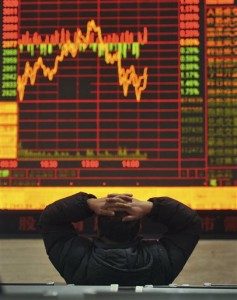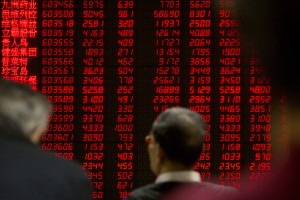What’s happening in China
Last week, China’s stock market plunged 10 percent, sending aftershocks throughout the rest of the world, according to PBS. According to The Telegraph, at one point during the first few weeks of the New Year, global stock market lost $2.5 trillion in value in four trading days.
In an attempt to stop market volatility, China has installed a circuit breaker rule, which will shut down stock market trading for the day if trading falls below 7 percent. According to Forbes, the circuit breaker rule shut down trading for almost an entire day on Jan. 7. Trading was suspended again on Jan. 9.

Although China quickly abandoned the circuit breaker rule, China’s backtracking hasn’t instilled any confidence on Wall Street. In the U.S., the Dow has dropped 1,437 points in just the first two weeks of the year. While the U.S. is in a bull market, a market where share prices are rising and buying stocks is encouraged, this steep of a dive has economies all over the world worried.
The value of the Yaun, China’s currency, is declining due to massive efforts to stabilize financial markets by the Chinese government. China pumped $500 billion into its market in 2015, and $108 billion in foreign exchange reserves in December alone. The government’s attempts at a bailout have only seemed to postpone further declines, rather than stop them.
China’s economic growth is also in a downward spiral, keeping investors worried. For over a decade, China has been one of the fastest growing economy’s in the world, and if it stops growing, countries that have depended on trade with China are also in trouble. Coupled with China’s rising debt and spiraling real estate market, China could be in for a recession.
While there is no doubt between investors that China’s economy is coming to a halt, few believe Beijing’s official reports on economic growth. Chinese officials claim that China is still growing at a rate close to seven percent, while independent experts speculate that China’s actual growth is probably half that.
Further distrust of China’s economy is stemming from fact that prominent Chinese business tycoons keep “disappearing.” While most of the disappearances are due to President Xi Jinping’s anti-corruption crackdown, the general lack of explanations for the disappearances are keeping investors worried.
What this means for the U.S.
The U.S. stock market is already volatile due to falling oil prices. According to CNN, low oil prices are sending a wave of bankruptcies throughout the energy sector. Investors are worried that the low oil prices are signaling that the global economy is in bad shape.

American businesses could also take a hit due to China’s new economic standstill. That’s because foreign trade is the most direct ling between the U.S. and China. According to State Street Global Advisors, U.S.-China trade is supposed to become the largest in the world over the next two years, exceeding the U.S.-Canada trade. However, if China’s economy continues to grind to a standstill, U.S.-China could slow down as well.
However, exports make up just 13 percent of GDP, according to CNN. This means that the U.S. economy isn’t dependent on foreign trade to drive the economy. Consumer spending accounts for more than two-thirds of the GDP, meaning that as long as consumers continue to spend money, the U.S. economy should remain relatively stable during China’s crisis.
“The impact on the U.S. economy appears to me to be more psychological than real,” said Ned Hill, National Advisory Council Professor of Finance at Brigham Young University. “This uncertainty in China, coupled with weak growth in Europe, troubles in the Middle East, and other places, bring uncertainty to investors. Investing is to a large extent influenced by perceptions—especially of risk. Raise the level of perceived risk and the market falls—every time!”
Another worry investors on Wall Street have about China is that the economic crash, coupled by the drastic declines in stock market, could kill the bull market U.S. is experiencing.
The expected outcome
“In the long term,” said Hill, “China will have to make adjustments…. They will no longer be able to prop up inefficiencies in their banking system and other government-run enterprises. This will be uncomfortable because Chinese leaders have like to feel in control of political, social and economic activity in the country.




